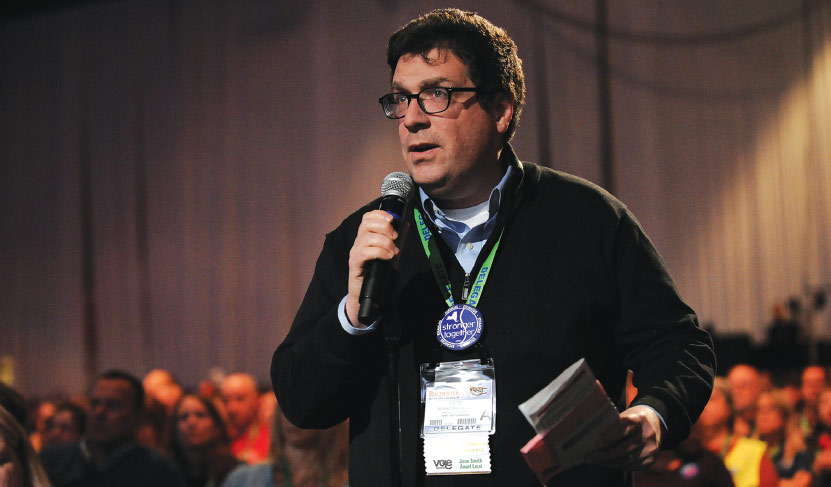After passionate remarks from both sides, delegates rejected three proposed constitutional amendments that would have allowed regional voting for NYSUT Board members and statewide officers.
It's not often votes at the Representative Assembly go beyond a simple voice vote. But for the first of three proposed amendments, President Karen E. Magee asked for a standing vote to get a visual. When that wasn't clear, it took an old-fashioned count by tellers who used hand-held clickers to total the number of delegates standing for each side. By a vote of 900-617, delegates let stand the "non-concurrence" recommendation of the Constitutional and Bylaw Amendments Committee that rejected proposed changes to the Constitution.
The proposed amendments would have allowed:
- at-large directors to be elected by representatives of their respective constituencies, rather than by a statewide vote by delegates at the RA;
- a call for special election district meetings to fill all officer and director at-large vacancies as they occur, rather than having them filled by the NYSUT Board; and
- meetings in regional offices so certified delegates could cast ballots without attending the RA. The regional meeting votes would take place concurrently with balloting at the RA.
Earlier, more than 200 members of the Constitutional and Bylaw Amendments Committee recommended non-concurrence for the three amendments.

Kenmore TA’s Peter Stuhlmiller speaks in favor of the amendments.
Speaking for the amendments, Mike Lillis of Lakeland Federation of Teachers termed it an "unhealthy democratic process" for at-large directors to be elected without the support from the regions they represent. Kenmore TA's Peter Stuhlmiller urged delegates to approve the constitutional amendments in the spirit of Magee's "fantastic address" calling for member engagement. "The most fundamental part of (involvement) is the right to vote," Stuhlmiller said, but noted that RA travel costs deter participation. Shenendehowa TA's Megan Delarosa called it "hypocrisy" not to support the multiple pathways for voting that were affirmed by last year's RA for general elections.
Those speaking against regional voting — the position that prevailed — noted logistical difficulties in holding regional votes and the importance of NYSUT's many constituencies — SRPs, retirees, health care and higher education — to be elected on a statewide basis.
As president of a local with only 155 members, Greg McCrea of Westhill EA said attending the RA amplifies the voice of smaller locals. "It is only because of this assembly that you all know my face and voice," he said. Attending the statewide RA also gives leaders the opportunity to interact with delegates from other locals, he said.
Retiree Sandy Bliss, who was there when the NYSUT constitution was drawn up in 1973, said the election provisions were purposefully crafted to bring two predecessor organizations together and preserve both the pure representative and at-large representation models.
"This is what democracy looks like," Bliss said, warning that decentralization would "balkanize" the strong state organization. "It is our state union coming together as locals around the state … It's a structure that served us in the 1970s, in the '80s and the '90s … and continues to serve us today."
Michael Mendel of United Federation of Teachers said electing at-large directors on a statewide basis "is a smart way to set up a legislative body, much like U.S. senators are elected on a statewide basis and House representatives are elected by their constituents. "If we do this [amendment], we would have only five people — the president and four officers elected on a statewide basis."